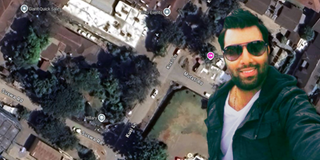
IT Manager Saagar Jayantilal Panara was murdered in Parklands.
Two months before his cold-blooded murder, a group of unidentified police officers stalked and confronted Saagar Jayantilal Panara, an IT manager who was killed in Parklands a week ago.
In the space of 24 hours, they made a series of serious but unsubstantiated allegations against Panara.
The 36-year-old Kenyan, who had no previous run-ins with the police or other security agencies, was first threatened with arrest at an airport, then accused of selling an unidentified stolen item and having a drug dealer as a friend – all in less than 24 hours between July 4 and 5, 2024.
During these three incidents, police officers revealed information to his colleagues at Mart Networks and legal representatives that could now be crucial to investigators looking into Panara's gangland-style murder on the evening of September 24, 2024.
Despite being threatened with arrest over incidents that police officers never made clear to Panara, there was no recorded investigation against him.
Panara was a manager at Mart Networks, an ICT solutions company based at Museum Hill Centre in Westlands, Nairobi.
He was shot dead at the gate of his matrimonial home as he arrived from Parklands Sports Club.
Police records indicate that pamphlets found at the scene referred to a land dispute with unknown people over a plot of land in Narok.
But the Nation has established that there is no public record of anyone challenging the Panara family's ownership of the land in Narok, and the deceased in particular had nothing to do with the property.
Could the leaflets have been a diversionary tactic by the killers to cover their tracks and mislead investigators?
At the time of going to press, National Police Service spokesperson Resila Onyango had not responded to the Nation's queries on what specific offences the officers who accosted Panara may have been investigating and whether there had been any progress in the murder investigation.
Panara was at Jomo Kenyatta International Airport (JKIA) on the evening of July 4, 2024 when a group of men claiming to be police officers approached him.
The men confiscated Panara's passport but did not say what they wanted with him.
After a few minutes, the men returned his passport and let Panara go his way. Or so he thought.
The next morning, five men drove into the Mart Networks offices on Museum Hill and introduced themselves as detectives who wanted to talk to Panara.
Panara was a manager at Mart Networks.
At the gate, the men showed a security guard Panara's photograph on one of their mobile phones before entering the building.
Panara's receptionist told the officers that her boss was not in. But the five men insisted, saying they had tracked Panara's movements through phone triangulation, which indicated that the 36-year-old was at Mart Networks offices.
When someone from Mart Networks contacted Parklands police station, two officers were sent to verify the identities of the five visitors.
The arriving officers confirmed that three of the men were detectives from Kabete police station and the other two were colleagues from Parklands police station.
The five officers then claimed that Panara had sold an item, the nature of which they did not disclose, to a customer who was later arrested.
The officers claimed that they wanted to escort Panara to Kabete police station to record a statement about the item, which allegedly led to the arrest of another unidentified person.
The officers asked the receptionist to tell Panara to report to Kabete police station as soon as possible.
Panara instructed his lawyers to go to Kabete police station and find out which item had set off the alarm and led to someone's arrest, so that he could get details, including its origin and history, and include this information in his statement.
But at the Kabete police station, the lawyers were told that the detectives had lost interest in Panara's statement because they had other ways of getting the information they wanted, and that the person arrested in connection with the mysterious object had already been released.
Before the lawyers could leave, police officers at Kabete said they still needed Panara for another, unrelated matter.
They claimed they were looking for a suspected drug dealer who, according to phone records, had been in contact with Panara.
No names or details of the suspected drug dealer were given, and no explanation was given as to how and why the police had obtained Panara's call records without a court order.
The officers also failed to explain why they, and not the Directorate of Criminal Investigation's anti-narcotics unit, were investigating a suspected high-profile drug dealer.
Later that day, Panara received a call from one of his relatives saying that a house the family owned in Narok had been set on fire.
The incident was reported to Narok's Enaibelbel police station, but months later the investigation has yet to yield any results.
The storm seemed to have calmed down and life seemed to have returned to normal…until last week.
Police records show that Panara was accosted at the gate of his matrimonial home by a group of people who may have followed him from the Parklands Sports Club.
One of the assailants fired a bullet into Panara's neck, under his right ear, and the entire group fled.
Panara was rushed to the Aga Khan Hospital, where he died while receiving treatment.






